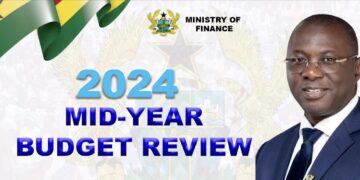In a comprehensive presentation to Parliament, Dr. Mohammed Amin Adam, Minister for Finance, outlined Ghana’s economic performance and future outlook during the Mid-Year Fiscal Policy Review for 2024. This presentation, delivered on behalf of President Nana Addo Dankwa Akufo-Addo, highlights the nation’s resilience in navigating global economic challenges.
Economic Context and Challenges
The past two years have seen significant global economic disruptions due to the lingering effects of the COVID-19 pandemic and ongoing geopolitical conflicts. These global issues have substantially affected Ghana, leading to increased living costs and limited job opportunities. The government acknowledges these hardships and has introduced measures aimed at restoring fiscal stability and economic growth.
Achievements in Economic Indicators
The government’s policies are yielding positive results. Ghana’s economy grew by 4.7% in the first quarter of 2024, surpassing the revised target of 3.1%. Inflation has been significantly reduced to 22.8% as of the end of June, down from a peak of 54.6% in December 2022. Additionally, the exchange rate has stabilized, and gross international reserves have increased to 3.1 months of import cover, up from 2.5 months in the previous year.
Key Government Initiatives
Several key initiatives have been fast-tracked to enhance economic growth. Notable achievements include:
– Successfully concluding the second review of the Extended Credit Facility with the International Monetary Fund (IMF), resulting in a disbursement of $360 million, bringing the total to $1.6 billion.
– Completing the Debt Restructuring Programme with the Official Creditor Committee (OCC), covering $5.1 billion and resulting in approximately $2.8 billion in debt relief.
– Finalizing negotiations with Eurobond holders, leading to the cancellation of $4.7 billion in debt and providing $4.4 billion in debt service relief between 2023 and 2026.
– Implementing major reforms in State Owned Enterprises (SOEs), particularly in the Energy and Cocoa sectors, to enhance fiscal discipline.
– Launching the SME GO programme to support small and medium-sized enterprises with financial and technical assistance.
In addition, the government has invested 10 billion Ghana Cedis in the road sector since January 2024, significantly improving transportation infrastructure and supporting economic growth. Major infrastructure projects, such as the Komfo Anokye Teaching Hospital and the Tema-Mpakadan Railway Line, are progressing well. The digitalisation drive also continues with substantial investments in the National Identification Programme.
The government remains committed to fiscal consolidation through prudent expenditure management and improved revenue mobilisation. Strategic investments, particularly under the Economic Roads Improvement Programme (ERIP), aim to connect production areas to market centres and tourist sites.
Cabinet has approved several measures to bolster fiscal stability, including:
– The reintroduction of Road and Bridge Tolls in 2025.
– The operationalisation of the integrated property tax system.
– Amendments to the Fiscal Responsibility Act to reinstate suspended numeric thresholds.
Despite significant global economic uncertainties and domestic debt service obligations, the government is dedicated to sustaining economic growth and maintaining fiscal discipline. The positive trends in economic indicators demonstrate that Ghana is on the right path, with the economy rebounding stronger than anticipated.
The Mid-Year Fiscal Policy Review underscores Ghana’s resilient economic recovery and the government’s commitment to strategic, efficient, and intentional policies. As the nation continues to navigate through challenging times, these efforts offer a promising outlook for Ghana’s economic future.














